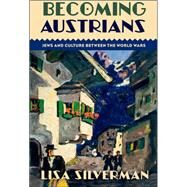Becoming Austrians Jews and Culture between the World Wars
, by Silverman, Lisa- ISBN: 9780199794843 | 0199794847
- Cover: Hardcover
- Copyright: 7/18/2012
The collapse of Austria-Hungary in 1918 left all Austrians in a state of political, social, and economic turmoil, but Jews in particular found their lives shaken to the core. Although Jews' former comfort zone suddenly disappeared, the dissolution of the Dual Monarchy also created plenty of room for innovation and change in the realm of culture. Jews eagerly took up the challenge to fill this void, becoming heavily invested in culture as a way to shape their new, but also vexed, self-understandings. By isolating the years between the World Wars and examining formative events in both Vienna and the provinces,Becoming Austrians: Jews and Culture between the World Warsdemonstrates that an intensified marking of people, places, and events as "Jewish" accompanied the crises occurring in the wake of Austria-Hungary's collapse, leaving profound effects on Austria's cultural legacy. In some cases, the consequences of this marking resulted in grave injustices. Philipp Halsmann, for example, was wrongfully imprisoned for the murder of his father years before he became a world-famous photographer. And the men who shot and killed writer Hugo Bettauer and physicist and philosopher Moritz Schlick received inadequate punishment for their murderous deeds. But engagements with the terms of Jewish difference also characterized the creation of culture, as shown in Hugo Bettauer's satirical novelThe City without Jewsand its film adaptation, other novels by Veza Canetti, David Vogel, A.M. Fuchs, Vicki Baum, and Mela Hartwig, and performances at the Salzburg Festival and the Yiddish theater in Vienna. By examining the role Jewish difference played in the lives, works, and deeds of a broad range of Austrians, this study reveals how the social codings of politics, gender, and nation received a powerful boost with the application of the "Jewish" label.







